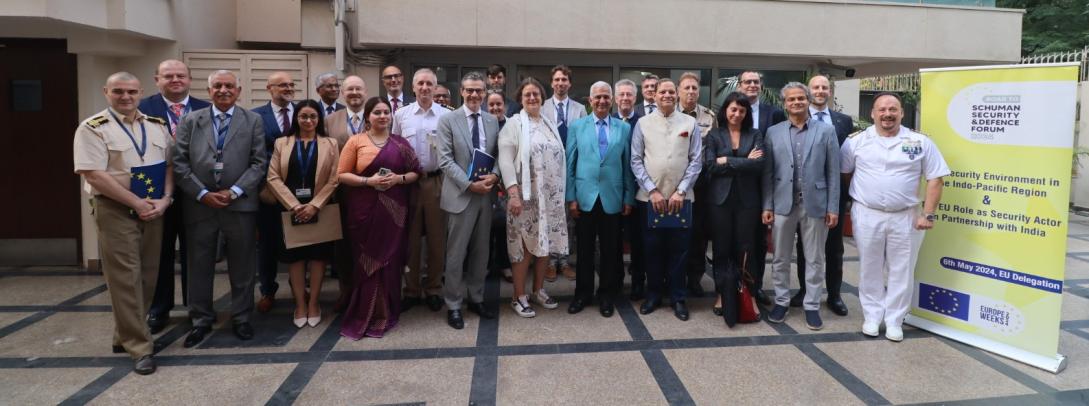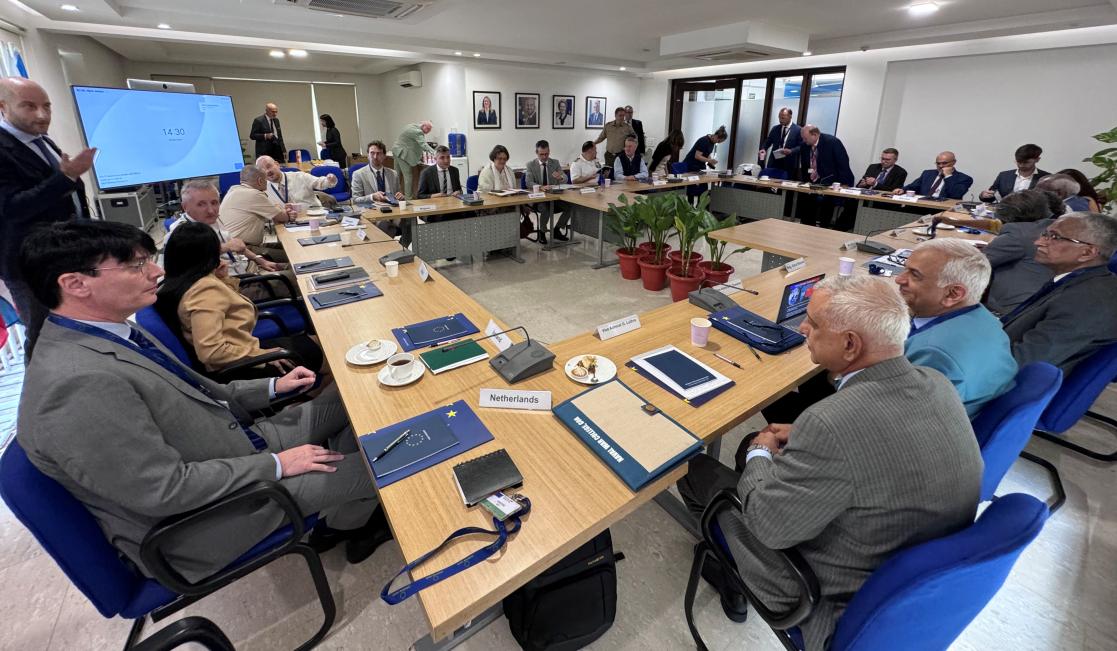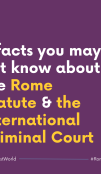Road to Schuman event in India: Dialogue on Enhancing EU India Defence and Security Cooperation, including in the Indo-Pacific region

New Delhi, 6th May 2024: The EU and India have made significant steps in the past years to deepen their security and defence cooperation including on counter-terrorism, cyber and maritime security. The Indo-Pacific at large and the Indian Ocean in particular are key areas where this cooperation can be further enhanced.
On 6th May, the Delegation of the European Union to India organised a Road to Schuman event titled “The security environment in the Indo-Pacific region and the EU’s role as security actor in partnership/cooperation with India”, gathering prominent security and defence experts and practitioners, think tanks, academia, diplomats, Indian government officials and EU member state representatives. This initiative is part of the Road to Schuman events that will feed into the second edition of the Schuman Security and Defence Forum, that will take place in Brussels on 28-29 May. The event was moderated by Nikunj Garg, Senior Managing Editor of NDTV.
The seminar provided a platform for dialogue, exchange of views on specific regional security challenges, maritime security environment, and policy developments covering the EU strategy for cooperation in the Indo-Pacific and India’s Indo-Pacific Oceans’ Initiative, EU-India maritime cooperation, and regional initiatives to address international maritime security issues. The seminar also enabled an assessment of the current and emerging challenges in the Indo-Pacific region while identifying future avenues for cooperation between the European (EU) and India.

@ EUD India, 2024
The first panel session focused on the “Overall security environment in the Indo-Pacific region: dynamics and likely evolution”. The panelists – Vice Admiral Pradeep Chauhan, Director General, National Maritime Foundation; Vice Admiral Girish Luthra, Distinguished Fellow, Observer Research Foundation; and Brigadier Rahul Bhonsle, Director, Security Risks Asia – discussed the origins and evolution of the Indo-Pacific concept, as well as its current geopolitical dimension and the different actors operating in it.
In the second panel session, speakers discussed the “EU-India security partnerships and cooperation: opportunities/constraints and how India considers EU as a security actor”. The three panelists – Indrani Bagchi, CEO, Ananta Aspen Centre; Professors Srikanth Kondapalli, Professor, Jawaharlal Nehru University; and Dr. Swasti Rao, Associate Fellow, Manohar Parrikar Institute of Defence Studies and Analyses – exchanged on the existing and potential areas of convergence between the EU and India in the security and defence field, in a bilateral and multilateral context.
During her address, Joanneke Balfoort, Director, Security and Defence policy, European External Action Service, said, “In this interconnected world, mutually beneficial peace, security and defence partnerships are more needed than ever. We see India, a country with considerable strategic weight on the global security balance, as a key partner for the EU in the Indo-Pacific.”
The global environment has turned more volatile and unstable with war and security threats on the rise. The EU is adapting to this new reality by enhancing its own security and defence but also by working together with international partners to address common security challenges to promote peace and stability. The growing inter-connectedness between dynamics in Europe and the Indo-Pacific region means that cooperation with Asian partners and most notably with India has become more important than ever. On the occasion, Hervé Delphin, EU Ambassador to India said, “EUNAVFOR Operation ASPIDES, recently launched in the Red Sea, together with EUNAVFOR ATALANTA, is a concrete example of the EU commitment to regional maritime security in the Indian Ocean region. While we have already stepped up our cooperation with India in the area of Maritime Security, Counter-terrorism, Cyber-security, Non-proliferation and Disarmament, other areas like Space, Hybrid and Cyber threats and security dimensions of Artificial Intelligence are possible areas of growth for EU-India cooperation.”
The second edition of the Schuman Security and Defence Forum (Schuman Forum) will take place in Brussels on 28-29 May 2024. It will bring together high-level representatives of the European Union (EU), EU Member states and partner countries, international and regional organisations, as well as leading think-tanks and academia. The Forum aims at looking for avenues of cooperation on how ongoing and potential peace, security and defence partnerships can respond to the most pressing common security threats and challenges and contribute to global peace and security as well as uphold the international rules-based order and multilateralism. India is one of the key partners invited to the Forum.

@EUD India, 2024
In the morning of 6th May, the EU and India also held their second Security and Defence Consultations, co-chaired by Director Balfoort on the EU side and Vishvesh Negi, Joint Secretary (International Cooperation), Ministry of Defence on the Indian side. During the consultations the two sides agreed to deepen their cooperation in security and defence. They both reiterated their commitment to a free, open, inclusive and rules-based maritime order in the Indo-Pacific region, underpinned by respect for territorial integrity and sovereignty, democracy, rule of law, freedom of navigation and overflight, unimpeded lawful commerce, and peaceful resolution of disputes in accordance with international law, notably the United Nations Convention on Law of the Sea (UNCLOS).
Both the European Union and Indo-Pacific countries have a stake in each other's prosperity and security. With its Indo-Pacific Strategy and the Global Gateway, the EU aims to contribute to stability, security, prosperity and sustainable development in the Indo-Pacific, fostering the principles of democracy, rule of law, human rights and international law acting as an “intelligent facilitator” for peace and security in non-traditional security domains, in full partnerships with the other actors in the region – mainly India.





